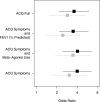Association of obstructive sleep apnea risk with asthma control in adults
- PMID: 20495105
- PMCID: PMC2940069
- DOI: 10.1378/chest.09-3066
Association of obstructive sleep apnea risk with asthma control in adults
Abstract
Background: Unrecognized obstructive sleep apnea (OSA) may lead to poor asthma control despite optimal therapy. Our objective was to evaluate the relationship between OSA risk and asthma control in adults.
Methods: Patients with asthma seen routinely at tertiary-care clinic visits completed the validated Sleep Apnea Scale of the Sleep Disorders Questionnaire (SA-SDQ) and Asthma Control Questionnaire (ACQ). An ACQ score of >or= 1.5 defined not-well-controlled asthma, and an SA-SDQ score of >or= 36 for men and >or= 32 for women defined high OSA risk. Logistic regression was used to model associations of high OSA risk with not-well-controlled asthma (ACQ full version and short versions).
Results: Among 472 subjects with asthma, the mean +/- SD ACQ (full version) score was 0.87 +/- 0.90, and 80 (17%) subjects were not well controlled. Mean SA-SDQ score was 27 +/- 7, and 109 (23%) subjects met the definition of high OSA risk. High OSA risk was associated, on average, with 2.87-times higher odds for not-well-controlled asthma (ACQ full version) (95% CI, 1.54-5.32; P = .0009) after adjusting for obesity and other factors known to worsen asthma control. Similar independent associations were seen when using the short ACQ versions.
Conclusions: High OSA risk is significantly associated with not-well-controlled asthma independent of known asthma aggravators and regardless of the ACQ version used. Patients who have difficulty achieving adequate asthma control should be screened for OSA.
Figures


References
-
- US Department of Health and Human Services National Institutes of Health National Heart, Lung and Blood Institute National Asthma Education and Prevention Program Expert panel report 3 (EPR-3): Guidelines for the diagnosis and management of asthma. Full report 2007. http://www.nhlbi.nih.gov/guidelines/asthma/asthgdln.pdf. Accessed August 15, 2009.
-
- Global Initiative for Asthma Global strategy for asthma management and prevention. http://www.ginasthma.org/Guidelineitem.asp?l1=2&l2=1&intId=1561. Accessed August 15, 2009.
-
- British Thoracic Society Scottish Intercollegiate Guidelines Network British guideline on the management of asthma: a national clinical guideline. Rev ed. http://www.brit-thoracic.org.uk/Portals/0/Clinical%20Information/Asthma/.... Accessed August 15, 2009.
-
- Bateman ED, Bousquet J, Keech ML, Busse WW, Clark TJ, Pedersen SE. The correlation between asthma control and health status: the GOAL study. Eur Respir J. 2007;29(1):56–62. - PubMed
-
- Fuhlbrigge AL, Adams RJ, Guilbert TW, et al. The burden of asthma in the United States: level and distribution are dependent on interpretation of the national asthma education and prevention program guidelines. Am J Respir Crit Care Med. 2002;166(8):1044–1049. - PubMed
Publication types
MeSH terms
Substances
Grants and funding
LinkOut - more resources
Full Text Sources
Medical
Miscellaneous

